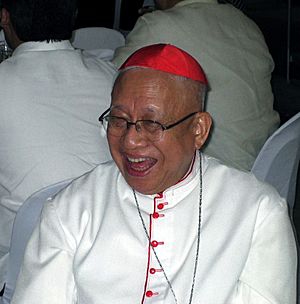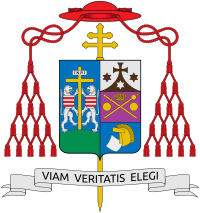Ricardo Vidal facts for kids
Quick facts for kids His Eminence Ricardo J. Vidal D.D. |
|
|---|---|
| Cardinal, Archbishop of Cebu | |

Cardinal Vidal
|
|
| Province | Cebu |
| Appointed | April 13, 1981 (Coadjutor) |
| Enthroned | August 24, 1982 |
| Reign ended | January 13, 2011 |
| Predecessor | Julio Rosales |
| Successor | José S. Palma |
| Other posts | Cardinal-Priest of Santi Pietro e Paolo a Via Ostiense |
| Orders | |
| Ordination | March 17, 1956 |
| Consecration | November 30, 1971 by Carmine Rocco |
| Created Cardinal | May 25, 1985 |
| Rank | Cardinal-Priest |
| Personal details | |
| Birth name | Ricardo Tito Jamin Vidal |
| Born | February 6, 1931 Mogpog, Marinduque, Philippine Islands |
| Died | October 18, 2017 (aged 86) Cebu City, Philippines |
| Buried | October 26, 2017 Cebu Metropolitan Cathedral Mausoleum, Cebu City, Philippines |
| Nationality | Filipino |
| Denomination | Roman Catholic |
| Residence | Cebu City |
| Previous post |
|
| Motto | VIAM VERITATIS ELEGI(lit. I have chosen the way of truth) |
| Coat of arms |  |
| Styles of Ricardo J. Vidal |
|
|---|---|
 |
|
| Reference style | His Eminence |
| Spoken style | Your Eminence |
| Informal style | Cardinal |
| See | Cebu |
Ricardo Tito Jamin Vidal (born February 6, 1931 – died October 18, 2017) was an important leader in the Catholic Church from the Philippines. He became a Cardinal in 1985. He also served as the Archbishop of Cebu from 1982 until 2010.
Contents
Early Life and Education
Ricardo Vidal was born on February 6, 1931. His birthplace was Mogpog, a town in Marinduque, Philippines. He was the fifth of six children in his family.
In 1937, he received his first communion. This is an important religious ceremony for Catholics. He went to Mogpog Elementary School for his first years of schooling.
Vidal continued his studies at different seminaries. These are schools where people train to become priests. He studied philosophy in Lipa, Batangas, and theology in Makati, Metro Manila.
Becoming a Priest and Bishop
Vidal became a deacon on September 24, 1955. Then, he was ordained as a priest on March 17, 1956. This ceremony took place in Lucena, Quezon Province. Bishop Alfredo Obviar was the one who ordained him.
After becoming a priest, Vidal worked as a spiritual director. He guided students at the Our Lady of Mount Carmel Seminary.
In 1971, he was appointed as a Coadjutor Bishop of Malolos. This means he was chosen to help the main bishop. Less than two years later, Pope Paul VI made him the Archbishop of Lipa.
In 1981, Pope John Paul II appointed Vidal to Cebu. He became the Coadjutor Archbishop there. On August 24, 1982, he officially became the Archbishop of Cebu. He took over from Cardinal Julio Rosales.
Vidal worked closely with Bishop Teofilo Camomot. He also helped start a religious group called the Catechist Missionaries of St. Theresa.
Leadership Roles
Vidal held many important positions in the Church. He was the President of the Catholic Bishops' Conference of the Philippines (CBCP) from 1986 to 1987. This group includes all the Catholic bishops in the Philippines.
He also served on important Church councils. He attended meetings called Synods, which are gatherings of bishops. These meetings discussed important topics like reconciliation and religious life.
Becoming a Cardinal
On May 25, 1985, Ricardo Vidal became a Cardinal-Priest. This is a very high rank in the Catholic Church. He was given the title of Cardinal-Priest of Ss. Pietro e Paolo a Via Ostiense in Rome.
In 2005, he was one of the cardinals who voted for a new Pope. This event is called a papal conclave. He helped elect Pope Benedict XVI. He was the only Filipino cardinal able to attend this conclave.
Helping the Philippines
Cardinal Vidal played a key role in important events in the Philippines. He and Cardinal Jaime Sin supported the 1986 Philippine People Power Revolution. This was a peaceful movement that changed the country's leadership.
As Archbishop of Cebu and head of the CBCP, Vidal spoke out. He joined other bishops in a statement about the government.
In 1989, President Corazon Aquino asked for his help. She wanted him to convince a general to surrender peacefully. Cardinal Vidal's actions helped prevent a violent conflict.
In 2001, during another important time for the country, Vidal helped again. He convinced President Joseph Estrada to step down from his position. Later, Vidal also asked for President Estrada to be pardoned. This helped bring peace and unity to the nation.
Later Life and Passing
Pope Benedict XVI accepted Cardinal Vidal's retirement in 2010. He was succeeded by Archbishop Jose S. Palma.
After retiring, Cardinal Vidal lived in Cebu City. He continued to lead Masses and attend Church events. He had some health issues in his later years. He passed away on October 18, 2017.
Honors and Recognition
Cardinal Vidal received many honors for his service. In 2010, the Senate of the Philippines honored him. They recognized his spiritual leadership and how he helped Cebu during difficult times. He was seen as a peacekeeper.
The House of Representatives also recognized him. The Province of Cebu gave him its highest award, the Order of Lapu-lapu. The cities of Cebu and Talisay made him an "adopted son." In 2009, the University of the Visayas gave him an honorary doctorate degree.
Calls for Sainthood
Many people have asked for Cardinal Vidal to be recognized as a saint. He himself was important in helping to make Pedro Calungsod a saint. Now, Filipino Catholics hope that Cardinal Vidal will receive the same honor.
During his funeral services, some leaders spoke about his holy life. They described him as humble and worthy of sainthood. Senator Vicente Sotto III said that he now had "a new friend in heaven" praying for him.
See also
 In Spanish: Ricardo Vidal para niños
In Spanish: Ricardo Vidal para niños
 | Leon Lynch |
 | Milton P. Webster |
 | Ferdinand Smith |

